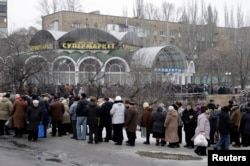The United Nations is appealing for $187 million to provide life-saving humanitarian assistance to 2.3 million of the most vulnerable Ukrainians who, it says, have reached the limits of their endurance after four years of conflict.
Most people view the ongoing fighting between the Ukrainian government and Russian-backed rebels in Eastern Ukraine as a political crisis. But U.N. Resident Coordinator in Ukraine, Neal Walker, views it as a forgotten humanitarian crisis in the heart of Europe.
While the existing problems directly affect the people in Ukraine, he warns the potential spillover effect into neighboring countries is powerful and worrisome.
"Just one simple example: increases in the number of cases of multi-drug-resistant tuberculosis and HIV, as well as issues of immunization, even an isolated case of polio. All of this in the heart of Europe. Whether these people are immigrating away from the conflict going east, north or west, the spillover implications are quite severe," Walker said.
After four years of war, people have exhausted their savings and their ability to cope. Aid workers say people cannot afford to buy food or medicine, to pay for shelter or heating or their children's education. In addition, they say millions of women, children and elderly are at daily risk of shelling, intensive fighting and other hostilities.
On top of that, Walker says U.N. agencies are unable to get funding for humanitarian support.
"We can say definitively that the humanitarian situation today, and going into this winter, is significantly worse than it has been since the onset of this conflict in 2014," he said. "Despite that, we are not getting the funding that we need to deal with it."
The United Nations received only 30 percent of its multimillion-dollar 2017 appeal, according to Walker.





